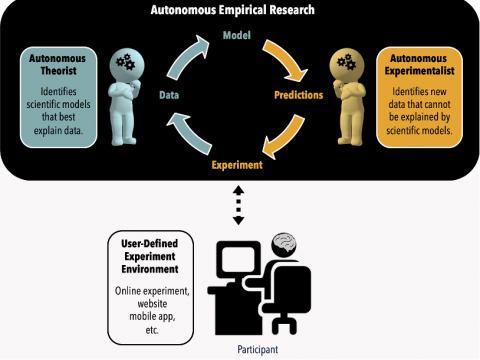The integration of behavioral phenomena into computational models of brain function is a fundamental staple of empirical research in neuroscience and psychology. Yet, researchers are beginning to accumulate increasing amounts of data without having the temporal, computational or monetary resources to integrate these data into scientific theories, and/or to test resulting theories in follow-up experiments. This project seeks to revolutionize the empirical research process in cognitive neuroscience and psychology by incorporating existing machine learning techniques into a closed-loop system for the generation, estimation and experimental validation of scientific models that explain human behavior and brain function. The researchers' goal is to devise an AI-based system for automating each aspect of the empirical research process, from the construction of a scientific hypothesis to conducting novel experiments. The researchers strive to devise this system as a general tool for empirical scientists who seek to advance their research at a faster pace without sacrificing reproducibility and transparency.
Potential Impact
Autonomous empirical research has the potential to revolutionize the empirical research process in behavioral sciences, including neuroscience, psychology, experimental philosophy and empirical political science, and it will ultimately help ramify the benefits that these disciplines hold for society at large. A behavioral research study with five successive experiments and 500 participants would take a human researcher about 20 weeks to complete using traditional methods. Autonomous empirical research could assist a human researcher to accomplish the same study in less than a week while ensuring quantitative rigor, reproducibility and transparency. In addition, autonomous empirical research could be applied in domains of industry where companies seek to capitalize on internal data, such as to enhance user experience.
Resources
- Code and tutorial
- Publications:
Collaborators
- Thomas L. Griffiths, Professor of Psychology and Computer Science at Princeton University
- Jonathan D. Cohen, Director of the Princeton Neuroscience Institute, Princeton University
- Matthew Flatt, Professor of Computer Science at University of Utah
- Vivek Srikumar, Professor of Computer Science at University of Utah
- Paul Buerkner, Junior Research Group Leader, University of Stuttgart
